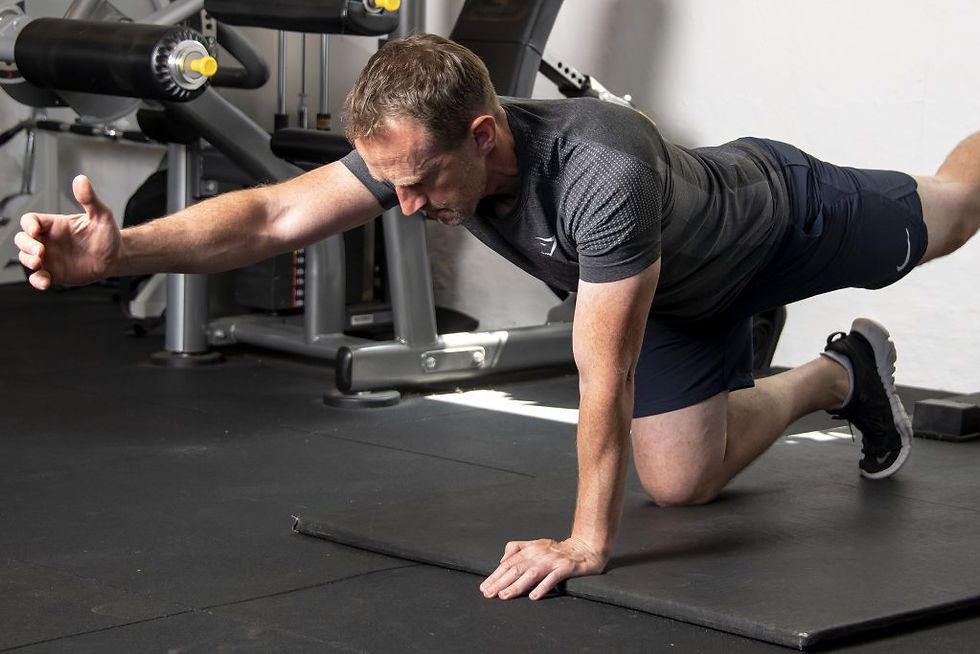Countdown to summer holiday? Lose those last pounds before you hit the beach.
- Simon Houston

- May 5, 2023
- 4 min read
Aiming to drop half a stone (or a bit more!) before you jet off to sunny places this summer? Follow our tips to get you on track.
Eat a higher protein diet that's also rich in fruits and vegetables.
A high protein diet can be effective for weight loss because it can help reduce appetite, increase satiety, and boost metabolism. Protein also helps preserve muscle mass while the body is losing fat, which can help prevent a drop in metabolic rate. Here are some tips for incorporating a high protein diet for weight loss:
Choose lean sources of protein and include them at every meal: Opt for lean protein sources such as chicken breast, turkey and fish. We love the higher protein yoghurt pots that can dish out 15-22g of protein per hit. These are the perfect puddings if you have a lean protein salad for lunch and find yourself still peckish. The new Chocolate Pudding flavour from Arla is delicious and available at bigger Sainsburys. Having adequate protein at meals does an amazing job keeping energy levels up and massively reducing the need to snack.
Include vegetables and fruits: While protein is important, it's also important to include a variety of vegetables and fruits to provide essential vitamins, minerals, and fiber. Our favourite veg are broccoli and cabbage for fibre, nutritional density and versatility and berries for convenience, flavour and stunning longevity promoting micronutrients.
Track your calories
To lose weight, you need to create a calorie deficit. This means burning more calories than you consume. Use a food tracking app to monitor your calorie intake and make sure you're staying within your daily limit.
This may sound like a silly detail or even a minor nuisance. But we're here to tell you that tracking your calories is perhaps the most important thing you can do to aid swift weight loss before you hit the beach/pool. Why's that? We all have an average 'run rate' of how many calories we burn through. Our client Nancy lost six pounds in just over a month simply by reducing her calories by 400 and walking a bit more. Virtually painless.
Until she started tracking her food intake, Nancy had no idea how many calories she'd been consuming and had been eating ‘unconsciously’ – to the amount of about 400 calories a day!

Strength train
Strength training is essential for building lean muscle mass which in turn increases your body's resting metabolic rate - meaning you burn more calories while you're watching Netflix! Aim to strength train at least two to three times per week.
Here are some tips for using strength training to support fat loss:
Focus on compound exercises: Compound exercises work multiple muscle groups at once, allowing you to burn more calories and get a bigger overall training effect. Examples of compound exercises include squats, deadlifts, bench presses, and rows.
Use moderate to heavy weights: To stimulate muscle growth and promote fat loss, you'll want to use weights that are heavy enough to challenge you. Aim to do sets of 8-12 reps per exercise, using a weight that feels challenging by the end of each set.
Incorporate high-intensity intervals: Interspersing short periods of high-intensity exercise, such as sprints or jumping jacks, can help to boost your metabolism and promote fat loss.
Keep rest periods short: To maximise the calorie-burning effect of your workout, keep your rest periods between sets short. Aim to rest for no more than 30-60 seconds between sets.

Move
Most of us have some sort of fitness tracker built into the devices we wear. Whether it be a dedicated FitBit style band, a smart watch such as Apple Watch or carrying around our phone in your pocket, chances our you're already. We have such a wealth of stunning places to wander round this time of year from the Skyline Walk, Brown's Folly in Bathford to the Warleigh Weir via Brassnocker. Or act quick and you can catch the Bluebells!! Walking really is our favourite form of movement - easy on both the joints and the eyes. And keeping track of your steps via a wearable device means that you know you're using this relaxing experience to help meet your fat loss goals.
Sleep
Getting enough sleep is crucial for maintaining a healthy weight and supporting weight loss efforts. There are several reasons why sleep is important for weight loss:
Sleep affects appetite: Lack of sleep can increase both hunger and cravings, particularly for high-calorie, high-carbohydrate foods like crisps and biscuits. Sleep deprivation disrupts the hormones Ghrelin (which stimulates the appetite) and decreses Leptin that suppresses the appetite.) According to author Robb Wolf, former research scientest and author of Wired to Eat, If you struggle with weight gain, health problems, depression or a number of other issues, consistently good sleep is likely one of the most important things you can do for yourself.
Sleep affects metabolism: Lack of sleep can also slow down metabolism, which can make it harder to lose weight. This is because sleep deprivation can lead to insulin resistance, which means that the body is less able to use glucose for energy and more likely to store it as fat. So this is a case where doing nothing (sleeping!!) can help you lose fat - what's not to like!!
Sleep affects energy levels: When you don't get enough sleep, you may feel tired and sluggish, which can make it harder to stick to a healthy diet and exercise routine. Most of us have hit that 'I'm too exhausted to go to the gym' wall - easily avoided if you get adequate sleep.
Overall, getting enough sleep is essential for weight loss and maintaining a healthy weight. Most adults need 7-9 hours of sleep per night, so make sure to prioritise sleep as part of your weight loss plan.







Comments